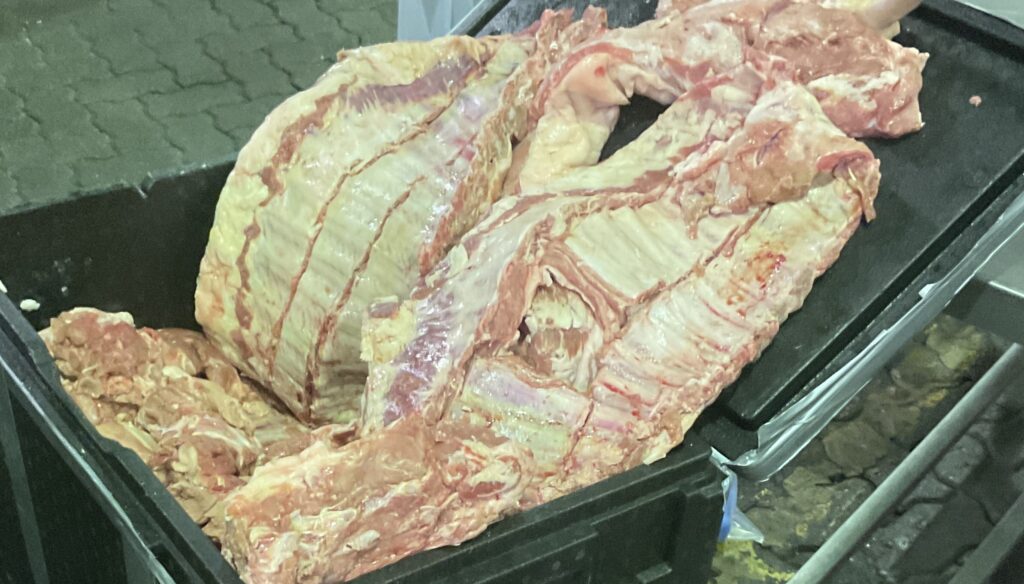The government has been accused of ‘leaving the UK in the firing line’, after it rejected, parked or only ‘partially accepted’ the majority of recommendations made in a hard-hitting report by MPs, which was intended to address the UK’s ‘illegal meat crisis’.
In a report published in September, the Environment, Food and Rural Affairs Committee accused the government of sleepwalking into its next big food safety crisis and urged it to take action to stem the flow of illegal imports entering the UK in unacceptably large volumes.
It made a number of recommendations for Defra, ranging from developing a strategy, with others, to tackle the flow of illegal meat imports, and improving defences at the main route of the trade, the Port of Dover, including the lack of resources for those working on the frontline.
In its response, published today, the government said it shares the committee’s concerns about illegal imports and the potential risks posed to animal health and food safety.
Defra said it was working closely with the Home Office and the Food Standards Agency to tackle this issue, with the support of Border Force, port health authorities, local authorities and the Devolved Governments, including Food Standards Scotland.
The recommendations
However, when it comes to the recommendations, it rejects some outright and suggests action on others should only be considered once the SPS negotiations with the EU have been concluded and implemented. This would put off powers to reduce ‘alarming amounts of illegal imports’ until 2027 at the earliest, EFRA commented.
For example, EFRA recommended that Defra should work with the Food Standards Agency and Food Standards Scotland to design a strategy to reduce demand for illegally imported products.
In its response, Defra said: “Our assessment is that a demand focussed strategy would be a longer-term piece of work, which would be of greater benefit once the post-SPS Agreement implementation environment is better understood.”
The government partially accepts the recommendation to create a strategy for POAO smuggling in collaboration with the National Food Crime Unit (FSA), the Scottish Food Crime and Incidents Unit (FSS), port health authorities, inland local authorities and Border Force. But rejects the recommendation to establish a taskforce for illegal imports of animal products by November 2025.
Defra says that it is already working with a number of these stakeholders to identify opportunities to improve the sharing of intelligence on an interagency basis and would look to incorporate the recommendations into any national strategy.
EFRA welcomed the commitment to take a more strategic approach and consider forming an inter-ministerial group on the ‘goods border’, but expressed disappointment that it stops short of the taskforce it recommended.
The government partially accepts a recommendation to give port health authorities stop, search and seize powers in relation to animal products and funding for enforcement presence at the border.
But it says the relevant powers of enforcement to start fining and prosecuting repeat offenders and those who are attempting to smuggle significant amounts of animal products do not sit with Defra, so rejects the notion of a Defra-led plan to do this.
It accepts a call restore relations with the authorities at the Port of Dover but insists it cannot commit to an unbudgeted and immediate increase in DPHA funding for this financial year.
Lack of urgency
EFRA welcomed the fact that the government has partially accepted many of its conclusions and recommendations, but the MPs said they were ‘concerned about the lack of urgency from ministers’.
It stressed that its report highlighted the limited powers of UK systems and procedures to halt the large and increasing volumes of meat entering the UK. Since the report was published, the Dover Port Health Authority has revealed that more than 20 tonnes of illegally imported meat was seized during September.
EFRA chair Alistair Carmichael said: “The SPS Agreement is not going to regulate those who chop up animals and transport them in suitcases – which we witnessed on the Committee’s visit to the Port Health Authority in Dover.
“The Government’s approach to threats to the UK’s biosecurity is to leave the UK sitting in the firing line. Pathogens don’t wait for policy — that’s why urgency in biosecurity matters.
“African Swine Fever, Foot and Mouth Disease – whatever the next threat to animal health will be – we cannot wait for the UK’s negotiations with the EU to conclude, never mind wait for implementation.
“Our report found that there is currently no effective deterrent to meat smuggling and the risks to animal and human health, our food security, farming sector and the economy are significant.”




